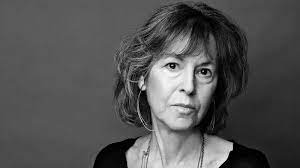
While the sale of poetry books continues to languish and the number of readers who love reading (asterisk: only not poetry books) continues to skyrocket, there’s still a healthy cottage industry in writing not poetry but ABOUT poetry. Specifically its death. Or long-term prognosis. Or philosophical place in the world (hint: look low).
Among that burgeoning genre, we can add Daniel Halpern’s New York Times column, “A Few Questions for Poetry,” wherein he puts poor poetry in the defendant’s box and grills it much like sourdough bread and cheese (mmm, can we add a slice of pickle?).
The column includes poets attempting to answer “Why poetry?” also known as the mystery of life. “Now pinch hitting for poetry, which ironically cannot speak for itself, number 12, Louise Glück!” Cheer from the crowd. All nineteen of it.
Louise finds consolation in this philosophy: No one buys poetry books much, but at least, when they do, they tend to keep them much longer than, say, a Scott Turow best seller. Feeling better, everyone?
Richard Ford, who is not a poet but somehow crashes the gates here, probably because he responded to Halpern’s query, which 32 otherwise occupied poets did not, overthinks things and claims “Why poetry?” is a bad question. To prove it, he comes up with a much better (just ask him) one: “What is the nature of experience, and especially the experience of using language, that calls poetic utterance into existence? What is there about experience that’s unutterable?”
Huh? Think I’ll write a poem rather than figure that one out.
In a rather lazy gesture, Halpern then gives us an Emily Dickinson response (and I’m almost sure this isn’t cut and paste from an e-mail). You know. The famous one about knowing it’s poetry when you feel like the top of your head has been taken off. To which I would ask the Amherst eccentric: How does anyone know what THAT feels like? And wouldn’t it make you feel more like Frankenstein’s monster than a reader in a state of poetic euphoria (and I don’t mean New Jersey)?
The most prosaic response comes from our Hartford insurance salesman by day, poet by night (uniform in the actuarial tables file cabinet), Wallace Stevens: “…to help people live their lives.”
Only I ask you: Have you ever read a Wallace Stevens poem and felt like it helped you to live your life? I mean, now that I’ve read “The Emperor of Ice Cream,” I can get on with my day, knowing exactly what to do if I find the night help or a co-worker has stolen Christmas candy from my desk drawer again?
Which brings us to this question: “Why columns about why poetry?”
Oh, yeah. Because they sell and some people even read them. Unlike poetry.

